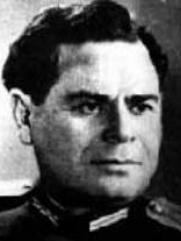Khaim Krasnokutsky was born in 1904, in the small town of Smela, the Cherkassy region (Ukraine), in the family of a public servant. In 1920, he finished high school and studied for two years at a medical school. He went on to work as a physical education instructor. In 1926, Krasnokutsky was drafted into the Red Army. After being discharged, he enrolled in a training course for infantry commanders, completing it in 1930. In 1939, the 123rd Infantry Division was formed, and Captain Krasnokutsky was appointed a battalion commander in it. His unit took part in the Soviet annexation of Eastern Poland in 1939, in the aftermath the Molotov-Ribbentrop Pact. In 1940, Krasnokutsky fought in the Soviet-Finnish Winter War, and was awarded the order of the Hero of the Soviet Union for organizing the construction of an assault bridge and securing the battalion’s crossing of the expanded front.
After the outbreak of the Soviet-German War, Captain Krasnokutsky served on the Leningrad Front. He was a brave and proactive officer with experience in military affairs, and his regiments carried out important operations, which foiled Hitler’s plans to capture Leningrad by the summer of 1942 and prevented the German Command from transferring units to the Stalingrad Front. In June 1944, Krasnokutsky's regiment reached Riga and took part in the liberation of Latvia and Estonia, and in the fighting in the Courland Pocket. After the surrender of the German forces in the Pocket, Krasnokutsky's active military service came to an end. At the time, he was the commander of the 59th Infantry Regiment, having held this post since 1942. In the course of the war, Krasnokutsky was awarded the Order of the Red Banner (1944) and the Order of the Red Star (1944). He had repeatedly been offered promotion to the rank of major general, but always declined, citing ill health as a result of combat wounds. After the end of the war, Krasnokutsky was finally promoted to major general. He remained in the Red Army, and briefly served as head of the Military Department of the Novgorod State Teachers' Institute. Afterward, he lived in Kiev. In 1953, Major General H. M. Krasnokutsky retired to the reserve. He died in 1982.







